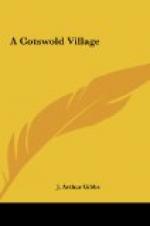“Marry, ’twas a right good chase, and bravely must thy steed have borne thee. But thou wast too venturesome, Master Shakespeare,” exclaimed the squire, “a-trying to jump that mound into the tyning by Master Blackett’s house.”
“Tell me, I prithee,” answered Shakespeare, anxious to turn the conversation from his own share in the day’s proceedings, “whose dog won the silver-studded collar this year in the coursing matches on Cotswold?” [25]
[Footnote 25: Merry Wives of Windsor,]
“Our Bill Peregrine, here, at the farm, carried it off. A prettier bit of coursing I never did see!”
“Ah! that was the country fellow that turned up when we sounded the mort by Col-Dene. He seemed to spring up out of the ground. He is a snapper up of unconsidered trifles, I’ll be bound. The fellow claimed the hide: he said the skin was the keeper’s fee.” [26]
[Footnote 26: 3 Henry VI, III. i.]
“That ’ould be he. I warrant he lent a hand in taking assay and breaking up the deer. Tis just what he enjoys.”
“Ah! I marked him disembowelling the poor dead beast in right good will, with hands besmeared with blood.” [27]
[Footnote 27: Henry IV., V. iv.]
Then they fell to talking of other things; and the honest old squire began to brag about his London days, and how he was once of Clement’s Inn.
“There was I, and little John Doit of Staffordshire, and black George Barnes, and Francis Pickbone, and Will Squele, a Cotswold man; you had not four such swinge-bucklers in all the Inns o’ Court again.” [28]
[Footnote 28: Henry IV., III. ii.]
But the old man was far too interested in his own doings to ask if his guest had ever been in London. It is the prerogative of age to take for granted that all younger men are of no account, and even as children, “to be seen and not heard.”
“To-morrow,” said the squire, “at break of day, we be a-going a-birding, to try some young falcons Bill Peregrine has lately trained. Wilt join us, Master Shakespeare?”
“Ah, that I will, sir! I know a hawk from a handsaw, or my name’s not William Shakespeare.”
By this time the cold capon and the venison pasty, as well as the “little tiny kickshaws,” together with a gallon of “good sherris-sack,” had been considerably reduced by the united efforts of the squire, the famished hunter, and those below the salt. During the meal such scraps of conversation as this might have been heard:
“Will you please to take a bit of bacon, Master Shakespeare?”
“Not any, I thank you,” replied the poet.
“What, no bacon!” put in the serving man from behind, in a voice of surprise bordering on disappointment.
“No bacon for me, I thank you; I never take bacon,” repeated Shakespeare, with some emphasis.
Then the master of the house would occasionally address a remark to his serving man about the farm, such as, “How a good yoke of bullocks at Ciren Fair?” or, “How a score of ewes now?” meaning how much are they worth. Once the serving man took the initiative, asking, “Shall we sow the headlands with wheat?” receiving the reply, “With red wheat, Davy.” [29]




